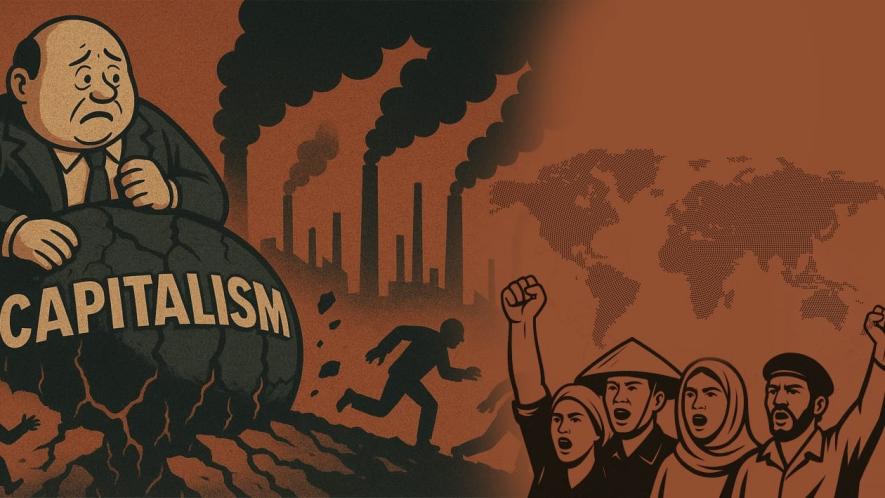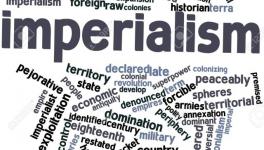Global Situation: The Perspective of Kuwaiti Progressives

Image: Taqadoom
Capitalism is a system of class exploitation in which wealth and resources are concentrated in the hands of few big capitalists, while the working class and proletariat in general – both in countries of the imperialist-capitalist center and dependent countries – are subjected to exploitation, inequality, injustice, and economic and social differentiation. In dependent countries, people are subjected to imperialist domination and the systematic plundering of their resources, capabilities, and control over their destinies.
The main contradiction of capitalism
The main contradiction in the capitalist system mainly stems from the dichotomy between capital and labor (that is to say the capitalist class versus the working class) under imperialism. No less importantly, it manifests itself in the contradiction between imperialist capitalism and the peoples of dependent countries on the one hand, and the contradiction between imperialist capitalism and socialist-oriented countries such as China and Cuba on the other hand.
National liberation movements constitute an important force in peoples’ struggle against imperialist capitalism to dispose of imperialist hegemony, break dependence, emancipate their political will, economic resources and natural wealth, and choose the path of independent, self-reliant and socially just national development. Indeed, dependent countries are perhaps the weakest link, which can be broken in the chain of the imperialist capitalist system, just as Russia and not advanced capitalist Europe was the weakest link in that chain at the beginning of the twentieth century, from which the socialist revolution was launched.
It is the duty of progressives to link the national liberation struggle with the international socialist liberation struggle.
The nature of the structural crisis in the capitalist-imperialist world order
The imperialist-capitalist system today is experiencing a comprehensive structural crisis, which is not limited to the cyclical nature of economic crises, but extends to the very structure of the system, in terms of the mode of production, mechanisms of distribution, the form of the state and the function of organized violence. It is not a temporary or accidental crisis, but a logical consequence of the course of globalized monopoly capitalism, which has reached such a degree of centralization and polarization that it impedes the continuation of social reproduction without destructive consequences.
These aspects, in particular, are escalating the continuously worsening and expanding capitalist-imperialist crisis:
- The relative decline of the dominant imperialist power and the change of the balance of power due to the demise of the unipolar era and the phenomenon of emerging countries.
- The tendency to rush toward war intensifies.
- The predicament of “bourgeois democracy” is caused by the widespread reluctance of the majority of citizens in the countries of imperialist centers to participate in elections, which almost reaches the level of boycott.
- The increase of populist tendencies, especially right-wing populism.
- The intensification of class exploitation and social injustice.
- The expansion of poverty and unemployment as a result of:
- Waves of high prices, inflation, low wages and pensions.
- The influx of refugees and immigrants, who seek asylum in the colonies of the imperialist center.
- The misery and suffering manifestations caused by privatization and the commodification of health and education.
- An increase in the capitalist exploitation of peoples, which results in hunger, climate, water, and energy crises, to an extent that threatens the reproduction of the human race.
- The crisis of surplus production has turned into a crisis of money and arms surplus production, as they cannot be disposed of as easily as the surplus of goods. This means that the contradictions of capitalism have worsened, in a way that makes overcoming the crisis difficult.
- The financial sector and its bubbles, alongside the sectors of non-real economy, overshadow the sectors of actual economies.
- Growing debt.
- The continuous shrinking of intervals between cycles of crisis.
The logic of Imperial accumulation has produced a world order based on the structural division between a center that accumulates surplus and marginalized parties bound by conditions of permanent subordination, which exposes them to exploitation.
This, in turn, clearly shows how the economic and social structures of the parties are being destroyed in favor of forced integration into the imperialist market, not as actors, but as reservoirs of raw materials and cheap labor, open markets, accompanied by the systematic plundering of their capabilities through the debt trap and the acquisition of financial surpluses.
This subordination is not only a political choice of subordinate governments, but is the result of a global structure imposed by the force of arms, debt, and international institutions that are working to impose the capitalist-imperialist model. Capitalism in subordinate countries does not produce a national bourgeoisie, but a class of compradors, whose function is to preserve and reproduce the structure of subordination.
The decline of imperial hegemony and the rise of multipolar world order
The world situation today shows clear signs of a gradual decline in the unipolar hegemony imposed by the United States after the collapse of the USSR. US imperialism is no longer able to impose its will with the same effectiveness as before, as it is exposed internally to structural crises (severe class inequality, institutional paralysis, rising racism, moral decay, cultural division), and externally to increasing challenges by rising powers such as China and Russia.
These factors have undermined the foundations of the global financial and trading system dominated by Western imperialism, with the aim of establishing a new multipolar world order. The resistance of peoples and their liberation movements, which are still standing up and facing hegemonic forces and their imperialism has also inflicted its impact.
However, this nascent multipolarity does not automatically mean the achievement of a more just system, unless the forces of national liberation and peoples invest in building independent sovereign projects that restore consideration to self-centered development and social justice.
Osamah Al-Abdulrahim is Secretary General Of The Kuwaiti Progressive Movement and Chief Editor of Taqadoom Platform.
Courtesy: Peoples Dispatch
Get the latest reports & analysis with people's perspective on Protests, movements & deep analytical videos, discussions of the current affairs in your Telegram app. Subscribe to NewsClick's Telegram channel & get Real-Time updates on stories, as they get published on our website.
























